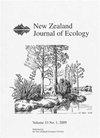围栏和硬释放的树栖壁虎迁移到没有引入哺乳动物的近海岛屿的空间模式和栖息地利用
IF 1.4
3区 环境科学与生态学
Q3 ECOLOGY
引用次数: 1
摘要
:在释放前临时写下是一种越来越多地用于蜥蜴易位的策略,以提高位点保真度并增加易位成功的机会。然而,它还没有在一系列蜥蜴分类群上进行测试。2015年至2018年间,新西兰特有的树栖壁虎(ngahere gecko,Mokopiirakau“北岛南部”)的49只个体被转移到惠灵顿附近没有哺乳动物的马纳岛,作为开发项目的缓解措施。在这项研究中,追踪了其中25只壁虎,其中壁虎要么被硬释放(n=9),要么被释放到0.52公顷的围栏中10-31个月(n=16)。使用无线电遥测技术,我们比较了两组壁虎在围栏移除后几周内的行为、栖息地使用、扩散和栖息地范围。硬释放的壁虎比封闭的壁虎从最初的释放点出发,在定位之间走得更远。硬释放的壁虎也比使用最小凸多边形和固定核方法的封闭壁虎有更大的家庭范围大小,尽管每组中的个体之间存在显著差异。两组壁虎的栖息地使用情况相似,但只有硬释放的壁虎使用草,这是出乎意料的,因为该物种的树栖性质。总之,我们的研究结果支持使用书面释放来转移树栖壁虎,以限制最初的转移后扩散并帮助种群建立。本文章由计算机程序翻译,如有差异,请以英文原文为准。
Spatial patterns and habitat use of penned and hard-released arboreal geckos translocated to an offshore island free of introduced mammals
: Temporary penning prior to release is a strategy increasingly being used in lizard translocations to improve site fidelity and increase chances of translocation success. However, it is yet to be tested on a range of lizard taxa. Between 2015 and 2018, 49 individuals of a New Zealand endemic arboreal gecko species (ngahere gecko, Mokopirirakau “southern North Island”) were translocated to mammal-free Mana Island near Wellington as mitigation for a development project. Twenty-five of these geckos were tracked for this study with geckos being either hard-released ( n = 9) or released into a 0.52 ha pen for 10–31 months ( n = 16). Using radio-telemetry, we compared the behaviour, habitat use, dispersal, and home ranges of geckos from both groups in the weeks immediately following removal of the pen. Hard-released geckos travelled further from their initial release point and between location fixes than penned geckos. Hard-released geckos also had a larger home range size than penned geckos using both minimum convex polygons and fixed kernel methods, albeit with significant variation among individuals within each group. Habitat use was similar in both groups, but only hard-released geckos used grass, which was unexpected due to the arboreal nature of the species. In conclusion, our results support the use of penned-releases for translocations of arboreal geckos to restrict initial post-translocation dispersal and aid population establishment.
求助全文
通过发布文献求助,成功后即可免费获取论文全文。
去求助
来源期刊

New Zealand Journal of Ecology
环境科学-生态学
CiteScore
3.00
自引率
12.50%
发文量
35
审稿时长
>36 weeks
期刊介绍:
The New Zealand Journal of Ecology is a biannual peer-reviewed journal publishing ecological research relevant to New Zealand/Aotearoa and the South Pacific. It has been published since 1952 (as a 1952 issue of New Zealand Science Review and as the Proceedings of the New Zealand Ecological Society until 1977). The Journal is published by the New Zealand Ecological Society (Inc.), and is covered by Current Contents/Agriculture, Biology and Environmental Science, GEOBASE, and Geo Abstracts.
 求助内容:
求助内容: 应助结果提醒方式:
应助结果提醒方式:


